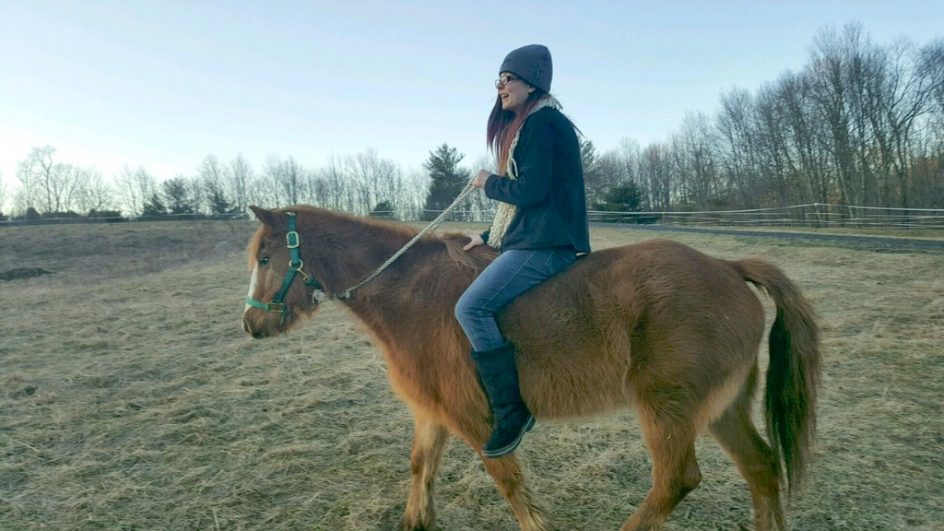
Treasure Wilkinson texted us this photo of Chloe and her daughter Jessica riding bareback over the weekend at Chloe’s new home. It was thoughtful of Treasure to send it, it made us both very happy, especially Maria: “this is what I wanted,” she said. And I knew what she meant.
Instead of standing around all day eating grass and hay, Chloe has found a great home for her – other horses, work to do, people around all day all week to ride her, feed her, brush her and keep her active and loved. This story touches many chords for me. And Maria doesn’t have to feel guilty every day for not doing more with her, she is a spirited working animal.
For one thing, this is precisely why I wrote my next book Talking To Animals, it calls for a new and wider understanding of animals than many people now have. If you understand horses, you know this is a good thing for her. Think about this, those of you who are sad about Chloe. Why are you sad if Maria and I, and Chloe herself, are happy and content?
If the point is to understand what is best for them, and they get that, what is the point of the sadness?
Chloe’s story also reminds me of the New York Carriage Horse controversy, where people who say they love animals are certain that work for animals is cruel, and that the horses are “depressed” and lonely working in New York City.
In this way of looking at the world, animals are simply vehicles to be exploited so that we project our own troubles and fears onto them, and use them to feel better about themselves, even if it makes their lives worse. We need a better and wiser understanding of them than this. What matters is what’s best for Chloe, not us.
Many animal right activists in New York freely admit that they would rather see the horses dead than pulling light carriages in Central Park. This is not understanding the true nature of animals, it is condemning them to oblivion, extinction and almost certain death and slaughter while hypocritically claiming to love them and to be fighting for their rights.
More than 150,000 horses are sent to Canada and Mexico to be killed each year, mostly by having nails driven into their heads. Is this really a better fate for them than being loved and valued in Central Park? Is is really better for Chloe to spend her life standing by the gate dropping manure and waiting for something to do than being groomed and brushed daily, ridden often, in the company of other horses in a wide green pasture in between?
This is a question all of us who love animals must ask ourselves if there are to be any domesticated animals left in our lives and the world? What is best for them, not our ideas of them.
Every time a horse is ridden, they are also brushed and groomed, talked to and exercised, cleaned up again and given some treats. Most horses can’t wait to get back to the barn, but for a horse like Chloe, being cared for in this way is as important as a border collie getting to work. It is what they need to be content and healthy.
Animals are different from one another. Donkeys love to stand around, taking in the sun observing the world, amusing themselves by grazing and exploring. Sheep are similar. They feel easily into our lives, they have everything they need. Donkeys love attention once or twice a day, then they go off on their own, they love having their own lives. I like that also.
We have eased our own guilt and discomfort, but also give Chloe the life she was meant to have, given happiness to a number of people who will live with her, love her and ride her. I am not sure what there is to be sad about.
Thanks to Chloe, I am getting more excited about Talking to Animals, this is the point of it, understanding animals and helping them to survive in our world. You can pre-order it on the phone – 518 677 2515 or on the Battenkill Books website and get a free classy tote-bag. I will also personalize and sign any books ordered there. There are at least 400 tote-bags left.
In a sense, Chloe is what the book is all about.
